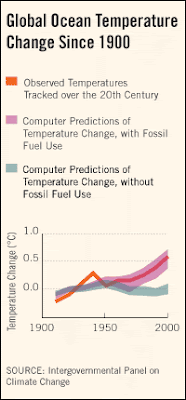posted by Sniderman
 [Cross-posted on The 2 Dollar Bill]
[Cross-posted on The 2 Dollar Bill]
It may not be a doomsday prediction yet, but it's not great news.
CARBON SINKS AREN'T KEEPING UP
We've all heard about the climate models predictions, but lately... new data suggests that the models might be painting a rosy picture. In a paper [pdf] released by the National Academy of Sciences this past Thursday, researchers say that
what's going on now in the real world is surpassing the assumptions of the climate models...
... and that economic activity is still becoming more carbon-intensive. Since 2000, carbon output per dollar of productivity has been increasing by 0.3% per year, whereas during the previous 30 years, it was dropping by an average of 1.3% per year. The result, the team discovered, is that atmospheric carbon concentrations are now increasing by 1.93 parts per million each year--the fastest rate of buildup since monitoring activities began in 1959 and considerably higher than the 1.58-ppm average for the 1980s and the 1.49 ppm for the 1990s.
THIS REALLY SINKS!
So carbon sinks may not be keeping up with civilization's carbon production.
What's a carbon sink? Something that uses Carbon Dioxide--CO2... and removes it from the atmosphere. There are plenty of natural carbon sinks. The oceans and plants (photosynthesis) take CO2 and in exchange yield Oxygen. But those natural sinks are only able to handle a certain capacity of carbon at any given time.
And by these scientists' estimates, the planet's oceans are not keeping up as they once were. The process isn't a fast reaction... it occurs on the order of hundreds of thousands of years according to Harvard Magazine. In other words, it doesn't seem like something that could be quickly turned around.
And that's our problem and likely our fault. Nearly 75% of the planet is covered in water... yet the 25% (less than that inhabitable) with people and our machines is pumping out increasingly greater CO2 emissions, methane and fluorocarbons .
WHAT'S WATER GOT TO DO WITH IT?
How does that translate into a warmer planet? Florida State University oceanographer Jeff Chanton says,
"the same heat trapping gases that are warming the Earth are also driving up the temperature of the ocean. About half of the carbon dioxide released into the atmosphere is absorbed by the ocean, keeping the Earth from getting too hot.While we sense the weather while we live on land, weather patterns are controlled in large part by ocean circulations. And ocean temperatures.
But rising greenhouse gas emissions, combined with the loss of trees — a key absorber of carbon dioxide —due to deforestation, places more of a burden on the ocean. Just as more carbon in the atmosphere means that we feel the heat, more carbon in the water means a warmer ocean."
We know that the planet's climate has been warming slowly for the past century or so... and especially within a more recent time window.
We know that human civilization's output of CO2, methane, and types of fluorocarbons has increased. For this reason, the U.N. Intergovernmental Panel on Climate Change (UN IPCC) says human activity as the biggest contributor to global warming.
STILL EDITING THE EXPERT REPORTS
All this... while the Bush Administration encouraged edits to the CDC's health report on the effects of global warming. Dr. Julie Gerberding of the Center for Disease Control created a 14-page report on human health consequences based on IPCC data. That report was edited to 6 pages... leaving out all references of health concerns brought by global warming.
The censored pages included
how extreme weather events such as floods and hurricanes will cause deaths, large-scale population displacement and contamination of drinking water. Other concerns included how increases in temperatures encourage the formation of ground level ozone, the primary ingredient of smog which can cause permanent lung damageAnd now, there's strong belief that the global warming train has left the station. (Unless you're Senator Inhofe (R-OK) who can't see the train at platform 9¾).and aggravate chronic lung diseases, such as asthma.
Let's hope we can still meet up with the train at the next platform.














